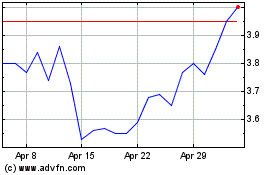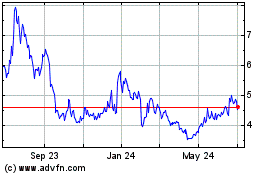Rocket Lab Successfully Completes Second Launch for NASA Climate Science Mission
June 05 2024 - 12:28AM
Business Wire
The second of two Electron launches for NASA’s
PREFIRE mission successfully lifted-off and deployed a climate
monitoring satellite just eleven days after the first launch
Rocket Lab USA, Inc. (Nasdaq: RKLB) (“Rocket Lab” or “the
Company”), a global leader in launch services and space systems,
today successfully completed the second of two Electron launches
for NASA’s PREFIRE (Polar Radiant Energy in the Far-InfraRed
Experiment) climate change-focused mission, completing a turnaround
of two launches within eleven days.
‘PREFIRE and Ice’ lifted-off from Rocket Lab Launch Complex 1 in
Mahia, New Zealand at 3:15pm NZST on Wednesday June 5th, 2024,
deploying the second of two satellites for the PREFIRE mission to a
525km orbit. The first mission, ‘Ready, Aim, PREFIRE’, was
successfully launched days earlier on May 25th, 2024 from the same
launch pad, demonstrating Rocket Lab’s ability to launch
consistently and in quick succession to meet customer mission
requirements.
With both satellites now in orbit, they will crisscross the
Arctic and Antarctic to study heat lost to space from the Earth’s
polar regions. Heat loss measurements collected by the PREFIRE
mission will help to improve climate and ice-loss models to better
predict Earth’s ice, sea level, and weather changes. The mission is
expected to operate for 10 months.
Rocket Lab founder and CEO, Sir Peter Beck, says: “I’m proud of
the team for delivering back-to-back mission success for NASA on
Electron once again. Quickly deploying both satellites to orbit
within eleven days of each other demonstrates our team’s skill and
experience, allowing NASA to maximize PREFIRE’s time in space
collecting important climate change data. We’re a long-trusted
launch partner for NASA’s biggest small satellite missions, and
it’s a privilege to continue supporting innovative science missions
like PREFIRE.”
Electron has now delivered 185 satellites to space across all
its launches, with today’s mission being Rocket Lab’s 49th Electron
launch overall and seventh mission of 2024. Electron remains the
United States’ second-most frequently launched rocket annually and
one of the most frequently launched rockets globally.
Details for Rocket Lab’s 50th Electron launch will be released
in the coming days.
+ About Rocket Lab
Founded in 2006, Rocket Lab is an end-to-end space company with
an established track record of mission success. We deliver reliable
launch services, satellite manufacture, spacecraft components, and
on-orbit management solutions that make it faster, easier, and more
affordable to access space. Headquartered in Long Beach,
California, Rocket Lab designs and manufactures the Electron small
orbital launch vehicle, a family of flight proven spacecraft, and
the Company is developing the large Neutron launch vehicle for
constellation deployment. Since its first orbital launch in January
2018, Rocket Lab’s Electron launch vehicle has become the second
most frequently launched U.S. rocket annually and has delivered
180+ satellites to orbit for private and public sector
organizations, enabling operations in national security, scientific
research, space debris mitigation, Earth observation, climate
monitoring, and communications. Rocket Lab’s family of spacecraft
have been selected to support NASA missions to the Moon and Mars,
as well as the first private commercial mission to Venus. Rocket
Lab has three launch pads at two launch sites, including two launch
pads at a private orbital launch site located in New Zealand and a
third launch pad in Virginia. To learn more, visit
www.rocketlabusa.com.
+ Forward Looking Statements
This press release contains forward-looking statements within
the meaning of the Private Securities Litigation Reform Act of
1995. We intend such forward-looking statements to be covered by
the safe harbor provisions for forward looking statements contained
in Section 27A of the Securities Act of 1933, as amended (the
“Securities Act”) and Section 21E of the Securities Exchange Act of
1934, as amended (the “Exchange Act”). All statements contained in
this press release other than statements of historical fact,
including, without limitation, statements regarding our launch and
space systems operations, launch schedule and window, safe and
repeatable access to space, Neutron development, operational
expansion and business strategy are forward-looking statements. The
words “believe,” “may,” “will,” “estimate,” “potential,”
“continue,” “anticipate,” “intend,” “expect,” “strategy,” “future,”
“could,” “would,” “project,” “plan,” “target,” and similar
expressions are intended to identify forward-looking statements,
though not all forward-looking statements use these words or
expressions. These statements are neither promises nor guarantees,
but involve known and unknown risks, uncertainties and other
important factors that may cause our actual results, performance or
achievements to be materially different from any future results,
performance or achievements expressed or implied by the
forward-looking statements, including but not limited to the
factors, risks and uncertainties included in our Annual Report on
Form 10-K for the fiscal year ended December 31, 2023, as such
factors may be updated from time to time in our other filings with
the Securities and Exchange Commission (the “SEC”), accessible on
the SEC’s website at www.sec.gov and the Investor Relations section
of our website at www.rocketlabusa.com, which could cause our
actual results to differ materially from those indicated by the
forward-looking statements made in this press release. Any such
forward-looking statements represent management’s estimates as of
the date of this press release. While we may elect to update such
forward-looking statements at some point in the future, we disclaim
any obligation to do so, even if subsequent events cause our views
to change.
View source
version on businesswire.com: https://www.businesswire.com/news/home/20240604340112/en/
+ Rocket Lab Media Contact Murielle Baker
media@rocketlabusa.com
Rocket Lab USA (NASDAQ:RKLB)
Historical Stock Chart
From Dec 2024 to Jan 2025

Rocket Lab USA (NASDAQ:RKLB)
Historical Stock Chart
From Jan 2024 to Jan 2025
